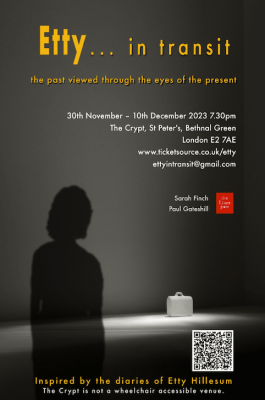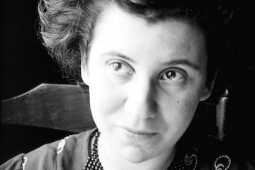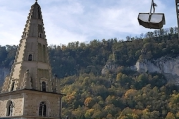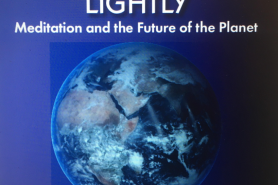Play: Etty…in transit

"I remember a walk one dreamlike summer night long, long ago I had visions of ruined cities. I saw old cities vanish and new cities arise, and I thought to myself even if the whole of this world is bombed to bits, we shall build a new world, and that one too will pass, but still life will be beautiful, always beautiful." - Etty Hillesum.
Earlier this year my father died quite suddenly, and a week later my cat died. After sharing this news with a friend, he sent me a critical edition of the diaries and letters of Etty Hillesum, which I slowly read in the early weeks of summer. 'Etty… in transit' reminded me of what a good friend Etty Hillesum had been to me during this painful time and showed me how she reaches others in similar ways.
'Etty… in transit' is a "multi-disciplinary show with an immersive installation in the crypt of a church in London." In the crypt, we see a live performance of the life of Etty Hillesum, told through verbatim excerpts from her diaries. The performance is interspersed with a series of projected vlogs which follow a mature fashion model, who is also a mental health ambassador, during the early months of the pandemic as she sinks into depression and reads the diaries of Etty Hillesum.
To give a short biography, Etty Hillesum was born in Middleburg in 1918 and moved to Amsterdam in 1932 to study law and Slavic languages but during the war, had to give up her studies. She then worked for the Jewish Council in Amsterdam before being assigned to Westerbork transit camp. She died in Auschwitz on 30 November 1948, aged 28.
In Amsterdam, she had also worked as an assistant for Julius Spier, a psycho-chirologist (a therapeutic practice which involved reading palms and wrestling and has thankfully gone out of fashion) who was formerly a student of Jung, and she would later become his lover. Her landlord was another lover of hers, and her diaries indicate that she was also attracted to women. Several members of her family struggled with mental illness - her brother Mischa, a renowned concert pianist, was institutionalised on multiple occasions - and had a strained though tender relationship with her parents. Other vignettes included an abortion, and a conversation that she had with a professor an hour before he committed suicide.
It is difficult to condense the 600-pages of Etty's diaries and letters into a 90-minute play, and I find it hard to tell how much it would have made sense to those going in with little or no knowledge of Etty's life. More emotional moments - such as the death of her love Julius Spier, which left me inconsolable for a day when reading her diaries - were largely diluted due to the sheer amount of plot that we had to tear through. It is a shame, too, that the vlogs couldn't have gone more deeply into the protagonist's mental health struggles and how Etty helped her with them.
Of most interest in the play and the diaries is Etty's spirituality: how she changes from being 'the girl who could not kneel' to one who spends half an hour every morning praying, reading the Bible, and seeing the presence of God in others. She also finds the small pockets of beauty that we ever find around us, such as the jasmine plant behind her house or the clouds at Westerbork.
As in her diaries, what is most striking about her spirituality is that it blossomed within the context of the Holocaust. She saw evil and oppression daily, ranging from its banal bureaucratic forms - groupings of three trees being redesignated as woods so that Jews couldn't really walk anywhere, for example - to the mass transit of emaciated Jews to Auschwitz. Yet, she could still write that "despite all the suffering and injustice, I cannot hate others." In the play's final third the audience is marched from one room to another, which gives a small and effective glimpse into how precarious life was for Jews across Europe.
At this moment in time, where there is devastating conflict throughout the world, and where our government is trying to circumvent international law to fly asylum seekers across the world, Etty Hillesum has much to say to us. A quote of Etty's which I have shared widely throughout the year, though wasn't featured in the play, is: "Ultimately, we have just one moral duty: to reclaim large areas of peace in ourselves, more and more peace, and to reflect it toward others. And the more peace there is in us, the more peace there will also be in our troubled world."
Like other spiritual writers of the twentieth century who came face-to-face with injustice, those such as Simone Weil, Dorothy Day, and Madeleine Delbrêl, I found that Etty encourages a grounded and incarnate spirituality, one which does not run away from our emotions, from the wisdom of Scripture, or from the realities in the newspaper.
Getting to know Etty Hillesum has given me a lot of hope and perspective. On a practical level, her example of journaling and seeking therapy has helped me immensely. And her deep honesty with herself, others and God has transformed the way that I approach myself, my neighbour, and prayer. In these tumultuous times, Etty is a good companion in helping us to find light in the darkness.
Etty… in transit, performed by Sarah Finch, is at the Crypt, St Peters Bethnal Green, E2 7AE, London, E2 7AE, until 10 December. For more information see www.ticketsource.co.uk/whats-on/bethnal-green/the-crypt-st-peters-bethnal-green-e2-7ae/etty-in-transit/e-radeqk
Sophia M White has an MPhil in Theology from Trinity College, Dublin and currently works in International Development. She was received into the Catholic Church in 2018 after trying to make a documentary about Catholics in the Bible Belt.


















